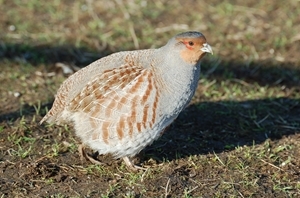 Business, wildlife charities and farmers are uniting in Lincolnshire on the 25th February at Riseholme College, Lincoln in an effort to boost the prospects for one of this country’s fastest declining birds; the wild grey partridge.
Business, wildlife charities and farmers are uniting in Lincolnshire on the 25th February at Riseholme College, Lincoln in an effort to boost the prospects for one of this country’s fastest declining birds; the wild grey partridge.
This once familiar farmland bird species, which flourished on farmland across the country, has declined by about 86 per cent over the past 40 years. GWCT research indicates that a lack of suitable-year round habitats such as insect rich brood rearing areas, which provides vital insect food for young chicks to eat when they first hatch, as well as an increase in nest predators are implicated in the decline.
Dr Roger Draycott, head of advisory with the GWCT said, “Lincolnshire offers fantastic potential for wild grey partridges and we are delighted to be running an event in this area on the 25th February to show the art of the possible. “There should be a lot more partridges in the area, but we need more people to carry out conservation work to help the species.”
The GWCT estimates that through its national Partridge Count Scheme Lincolnshire has the potential to hold more grey partridges than any other county in the country because of its extensive arable landscape. Currently the GWCT Partridge Count Scheme is monitoring 42 sites across the county, but as Roger Draycott says, “We would really like to at least double the number of farmers and Gamekeepers returning their spring and autumn count details. This information helps us to assess the population more accurately, and it also helps us to build a national picture of how the bird is faring across the country.”
The grey partridge group meeting, organised by the Game & Wildlife Conservation Trust on Wednesday 25th February starts at 6.30 pm will be led by Roger Draycott, who will be discussing how it is possible to integrate the running of a commercial arable farm with year-round conservation measures targeted at grey partridge recovery. Significantly, conservation projects for wild grey partridges have huge knock-on benefits for other struggling farmland birds too.
In addition, Jim Egan, from the GWCT’s Allerton Project research farm will be presenting an update on CAP reform and will be giving his own interpretation of how new greening measures will benefit rare species such as partridges and how farmers will be able to tap into funding through the Countryside Stewardship Scheme.
To persuade more farmers and landowners to become involved in grey partridge conservation, and importantly, to count the partridges on their land, the Game & Wildlife Conservation Trust awards the annual Grey Partridge Trophy, which is presented each year to the farm or estate that has contributed most to the conservation of grey partridges in Lincolnshire. Both the Grey Partridge Trophy and this evening meeting on 25th February are generously sponsored by Jas Martin & Co.
To attend the meeting and book a place, please contact Lynda Ferguson at the Game & Wildlife Conservation Trust, Telephone 01425 651013 or email: lferguson@gct.org.uk. Alternatively the Trust has an online booking facility at www.gwct.org.uk/greypartridgemeetings. The Lincolnshire Grey Partridge Group Meeting at Riseholme College starts at 6.30pm and costs £10 to include refreshments.
END
Photocaption: The launch of the Lincolnshire regional partridge group is boosting numbers of this declining bird across the region. Photocredit: Peter Thompson, the Game & Wildlife Conservation Trust.
Notes to editors
The Game & Wildlife Conservation Trust – providing research-led conservation for a thriving countryside. The GWCT is an independent wildlife conservation charity which has carried out scientific research into Britain’s game and wildlife since the 1930s. We advise farmers and landowners on improving wildlife habitats. We employ more than 60 post-doctoral scientists and other research staff with expertise in areas such as birds, insects, mammals, farming, fish and statistics. We undertake our own research as well as projects funded by contract and grant-aid from government and private bodies.
For information, contact:
Eleanor Williams
Telephone: 07592 025476
Email: press@gwct.org.uk